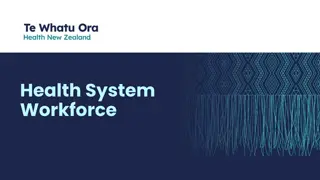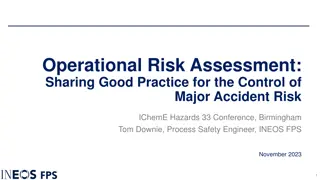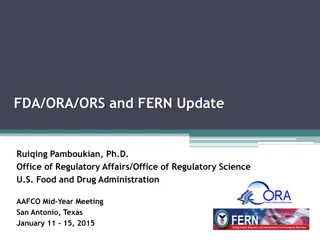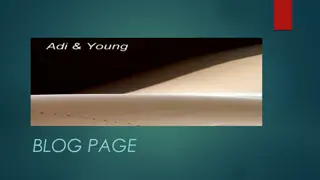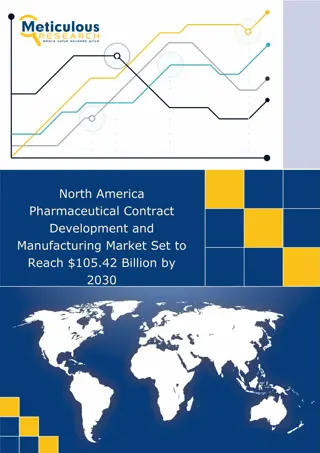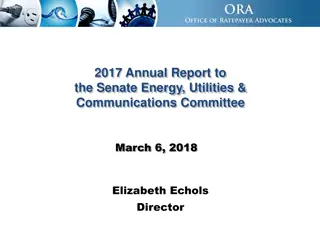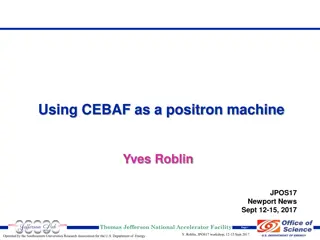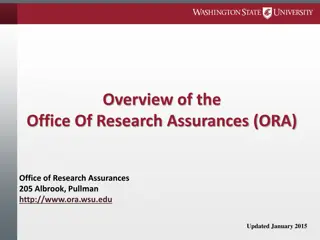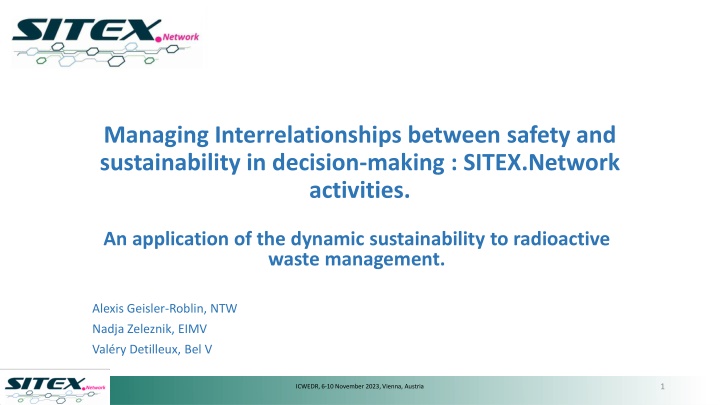
Interrelations between Safety and Sustainability in Decision-Making for Radioactive Waste Management
Explore the dynamic sustainability approach applied to radioactive waste management, focusing on the interplay between safety and sustainability in decision-making processes. Learn about the SITEX Network and its role in fostering cooperation and expertise in managing radioactive waste while promoting a shared safety culture. Discover how community involvement and long-term vision contribute to building sustainable solutions for current and future generations.
Download Presentation

Please find below an Image/Link to download the presentation.
The content on the website is provided AS IS for your information and personal use only. It may not be sold, licensed, or shared on other websites without obtaining consent from the author. If you encounter any issues during the download, it is possible that the publisher has removed the file from their server.
You are allowed to download the files provided on this website for personal or commercial use, subject to the condition that they are used lawfully. All files are the property of their respective owners.
The content on the website is provided AS IS for your information and personal use only. It may not be sold, licensed, or shared on other websites without obtaining consent from the author.
E N D
Presentation Transcript
Managing Interrelationships between safety and sustainability in decision-making : SITEX.Network activities. An application of the dynamic sustainability to radioactive waste management. Alexis Geisler-Roblin, NTW Nadja Zeleznik, EIMV Val ry Detilleux, Bel V 1 ICWEDR, 6-10 November 2023, Vienna, Austria
Dynamic sustainability Brundtland Report (1987) Aarhus Convention (2001) Sustainable development as development that meets the needs of the present without compromising the ability of future generations to meet their own needs ( 1). In order to contribute to the protection of the right of every person of present and future generations to live in an environment adequate to his or her health and well-being, each Party shall guarantee the rights of access to information, public participation in decision-making, and access to justice in environmental matters. ( 1) Sustainability requires [...] changes in the legal and institutional frameworks that will enforce the common interest. [...] The law alone cannot enforce the common interest. It principally needs community knowledge and support, which entails greater public participation in the decisions that affect the environment. ( 76-77) One core principle of sustainability : the ability of communities and institutions to build up appropriate decisions aiming at sustainability thanks to an open and reflexive framework of decision making. ICWEDR, 6-10 November 2023, Vienna, Austria 2
Dynamic sustainability Brundtland Report (1987) Aarhus Convention (2001) Both texts indicate a perspective of decision-making processes that is grounding on the capacity for the adapted actors, institutional or not, to constitute the appropriate means for making decisions. Both texts thus pave the path for the definition of a long-term vision of pluralistic decision-making, that we could designate by the term of dynamic sustainability. ICWEDR, 6-10 November 2023, Vienna, Austria 3
SITEX.Network What does SITEX means ? Sustainable network for Independent Technical EXpertise of Radioactive Waste Management Main functions interacting in the community of RWM About 20 members With an expertise, a regulatory or a society function. What is the overall objective? Enhance and foster cooperation at international level to achieve a high quality Expertise Function. Independent from Waste Management Organizations (Implementing Function). Aiming at supporting the Regulatory Function and the Society Function. In the field of radioactive waste management (including disposal). https://sitex.network ICWEDR, 6-10 November 2023, Vienna, Austria 4
SITEX.Network Shared safety culture Safety Culture is a keystone of RWM. Definition given by INSAG-4 in 1991: Safety Culture is a shared, dynamic, reflexive and active realisation of the best safety methods and standards. This culture is an assembly of characteristics and attitudes in organisations and individuals which establishes that, as an overriding priority, nuclear safety issues receive the attention warranted by their significance. A shared safety culture is a practical mean to improve safety in a sustainable way. Thanks to it multi-actors dimension, SITEX.Network implements activities strenghtening a shared safety culture in RWM. ICWEDR, 6-10 November 2023, Vienna, Austria 5
SITEX.Network SITEX activities regarding safe RWM long-term decisions The vision of dynamic sustainability grounds on an effective public participation. For this aim, it is crucial for civil society to develop its expertise in order to duly address the technical and complex issues of Radioactive Waste Management (RWM). One approach is engaging with civil society, and help to hire civil society experts on a permanent or temporary basis to review the decision making processes. E.g.: Belgium or Slovenia (local partnerships), France (local commission of information), Sweden (resourcing a national NGO). Civil society organisations access to the expertise of TSOs in SITEX.Network to elaborate a co-construction methodology of interactions the PEP serious game (= a SITEX activity and tool for interactions). ICWEDR, 6-10 November 2023, Vienna, Austria 6
PEP serious game by SITEX.Network PEP (Pathway Evaluation Process) A tool helping at understanding the views of different actors about the long term RWM and the complexity of its underlying decisions. Key messages PEP is not a tool to find the optimal LT RWM approaches. The main aim is to allow a pluralistic discussion between different actors on possible strategies to safely manage RWM (each strategies having advantages and disadvantages). PEP allows discussing a broad range of issues and envisioning situations and solutions participants may not have thought of. PEP helps the players to grasp the complexity of RWM that is considered here as a socio- technical issue, not only as a technical one. PEP discussions emphasize the importance for safety of transversal elements, such as the institutional structure and background, the meaningful public participation in the decision making process, the need of a pluralistic expertise, as well as the need of availability of financial resources, monitoring and decisions in long-term horizons (intergenerational dimension). ICWEDR, 6-10 November 2023, Vienna, Austria 7
PEP serious game by SITEX.Network How does it work in the practice ? Each player elaborates scenarios to question the robustness of a RWM pathway. Select one or two criteria to question the possible impact of the event Select one event ICWEDR, 6-10 November 2023, Vienna, Austria 8
PEP serious game by SITEX.Network How does it work in the practice ? The event card is positioned at a specific period of a RWM strategy (they are several board games, representing different strategies). One at a time, the players provide their views on the possible impact of the event, at the chosen period and considering the chosen criteria. This allows a pluralistic and structured discussion about Safety. ICWEDR, 6-10 November 2023, Vienna, Austria 9
Conclusions From Dynamic sustainability to Intergenerational approaches of safety The cornerstone of the dynamic sustainability perspective as it is experimented in the SITEX.Network is the necessity to build a shared safety culture between the RWM actors and to properly address the intergenerational dimensions of safety. It appears crucial to SITEX to build up as soon as possible in a LT RWM programme the theoretical and practical references that will root future actions in terms of decision making. A tools such as the PEP helps to fulfil this objective. The consideration of an intergenerational safety culture, as a conscious attitude from organisations and individuals regarding the continuous temporal responsibility on safety, is a key. This implies an attitude of vigilance about uncertainties, appropriate governance systems with participative processes. This culture coutributes to the emergence of possible reliable contributions from successive generations to an intergenerational stewardship of radioactive waste policies and facilities, adapted to several contexts including geopolitical and institutional changes, oriented to safety. ICWEDR, 6-10 November 2023, Vienna, Austria 10
Want to know more about SITEX or organize a PEP experience ? secretary@sitex.network valery.detilleux@belv.be ICWEDR, 6-10 November 2023, Vienna, Austria 11

